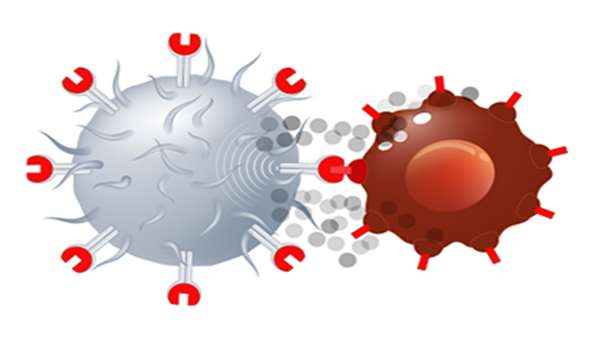CAR T cells targeting Aspergillus fumigatus are effective at treating invasive pulmonary aspergillosis in preclinical models
A new trick for CAR T cells
CAR T cells are most commonly thought of as a cancer therapy. Recently, however, investigators have been testing CAR T cells for additional, nonmalignant disease. Here, Seif et al. developed and tested a CAR T cell construct that targeted Aspergillus fumigatus hyphae, a ubiquitous mold that can cause invasive pulmonary aspergillosis in immunocompromised individuals. A. fumigatus–specific CAR T cells had potent and selective antifungal activity in vitro and in preclinical animal models, supporting further clinical development of these CAR T cells to treat invasive pulmonary aspergillosis.
Aspergillus fumigatus is a ubiquitous mold that can cause severe infections in immunocompromised patients, typically manifesting as invasive pulmonary aspergillosis (IPA). Adaptive and innate immune cells that respond to A. fumigatus are present in the endogenous repertoire of patients with IPA but are infrequent and cannot be consistently isolated and expanded for adoptive immunotherapy. Therefore, we gene-engineered A. fumigatus–specific chimeric antigen receptor (Af-CAR) T cells and demonstrate their ability to confer antifungal reactivity in preclinical models in vitro and in vivo. We generated a CAR targeting domain AB90-E8 that recognizes a conserved protein antigen in the cell wall of A. fumigatus hyphae. T cells expressing the Af-CAR recognized A. fumigatus strains and clinical isolates and exerted a direct antifungal effect against A. fumigatus hyphae. In particular, CD8+ Af-CAR T cells released perforin and granzyme B and damaged A. fumigatus hyphae. CD8+ and CD4+ Af-CAR T cells produced cytokines that activated macrophages to potentiate the antifungal effect. In an in vivo model of IPA in immunodeficient mice, CD8+ Af-CAR T cells localized to the site of infection, engaged innate immune cells, and reduced fungal burden in the lung. Adoptive transfer of CD8+ Af-CAR T cells conferred greater antifungal efficacy compared to CD4+ Af-CAR T cells and an improvement in overall survival. Together, our study illustrates the potential of gene-engineered T cells to treat aggressive infectious diseases that are difficult to control with conventional antimicrobial therapy and support the clinical development of Af-CAR T cell therapy to treat IPA.




ارسال به دوستان